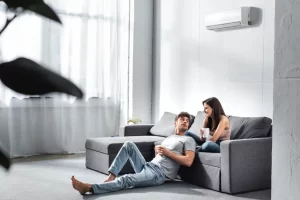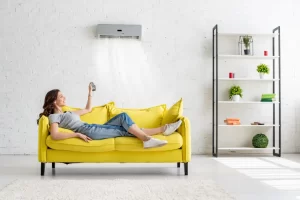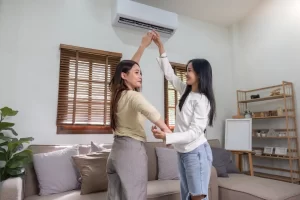Should you use a humidifier and air conditioning at the same time? The answer isn’t straightforward. In some cases, using both can enhance your comfort and indoor air quality, but it can also lead to increased energy usage and other issues.
In this article, we’ll dive into the pros and cons, helping you make an informed decision for your home.
Key Takeaways
- Using a humidifier with an air conditioner can enhance indoor air quality by adding moisture, which alleviates dry skin, itchy eyes, and respiratory problems caused by dry air.
- If not managed correctly, simultaneous use of a humidifier and air conditioner can lead to increased energy bills and strain on appliances, particularly in naturally balanced humidity climates.
- Maintaining ideal indoor humidity levels is crucial for comfort and health; utilising tools like hygrometers can help monitor and adjust humidity effectively, preventing issues like mould growth, excessively dry air, and various health problems such as allergies and asthma attacks.
How Humidifier and Air Conditioner Systems Work
Air conditioners, heating systems, and humidifiers play important roles in controlling the climate in our homes. While an air conditioning system works to remove heat and moisture from the air, it can sometimes leave the indoor environment feeling dry. This is because the evaporator coils in the HVAC system are designed to condense water vapour and remove moisture from the air. While effective at producing cool air, this process can make the air feel uncomfortably dry.
On the other hand, humidifiers work to add moisture to the air, creating a more comfortable and breathable environment. By increasing the humidity in the home, a humidifier helps counterbalance the moisture removal performed by the air conditioner, improving indoor air quality and ensuring comfort.
Whether it’s a portable humidifier placed discreetly in a corner or a whole-house humidifier integrated with the existing HVAC system, adding humidity back into the home is essential for maintaining a healthy and pleasant atmosphere.
Understanding how these two devices interact is crucial for creating a comfortable indoor climate that promotes well-being. By using the right humidifier and air conditioning in tandem, you can achieve a balance that allows you to:
- Breathe easily
- Stay cool
- Maintain a comfortable humidity level.
- Improve air quality
No matter what the thermometer reads outside.

What Are the Benefits of Using a Humidifier with Air Conditioning?
When your air conditioner removes the sweltering heat, it can also strip away the much-needed moisture, leading to discomforts such as dry skin, itchy eyes, and respiratory problems. High humidity can make individuals feel warmer than the actual temperature, emphasising the importance of dehumidification in air conditioning systems to maintain a comfortable environment. A humidifier can become your indoor air quality champion, adding moisture to the air and providing relief from these symptoms.
Moreover, by improving air quality, a humidifier can help ease cough symptoms and allergies, making your home a sanctuary for those with sensitive respiratory systems.
In addition to health benefits, using a humidifier with your air conditioner can have practical advantages. For example, balanced humidity levels can protect wooden furniture from warping and cracking, preserving the longevity of your cherished home decor. And let’s not forget the unexpected perk of reducing static electricity, a small but significant victory in the battle against sudden shocks and clinging clothes.
Choosing to use a humidifier alongside your air conditioner is not just about comfort; it’s about creating a healthy indoor environment where you can thrive. Imagine waking up refreshed, without the stuffiness or sinus irritation that dry air can bring, and stepping onto a floor that doesn’t feel like a minefield of static surprises. The harmony of moisture and coolness can transform your living space into the oasis you deserve.
Potential Drawbacks of Using Both Devices Simultaneously
Simultaneously using a humidifier and air conditioner isn’t always a walk in the park. While they can both work to maintain a comfortable indoor climate, there are potential drawbacks worth considering.
Running both devices when not necessary can lead to wasted electricity and higher energy bills. This is particularly true in climates where the humidity levels are naturally balanced or during seasons when the air is not excessively dry.
It is crucial to monitor relative humidity to avoid issues like mold growth and to ensure optimal performance of both devices.
In addition, using a humidifier and an air conditioner simultaneously can create a push-and-pull effect. The humidifier adds moisture to the air while the air conditioner removes it, resulting in a potential strain on both appliances. This strain can shorten the lifespan of the appliances, leading to more frequent maintenance or premature replacement. It is essential to recognise when the balance between the two devices becomes costly and use them wisely to avoid unintended consequences.
Finding the right balance for your home’s climate needs is important, as well as ensuring that each device complements the other rather than working against it.
The Role of AC Units in Controlling Air Quality
Air conditioning units play a significant role in controlling air quality by removing excess moisture, dust, and other pollutants from the air. These units are equipped with filters that capture dust, pollen, and other particles, thereby improving indoor air quality and reducing allergy symptoms.
By controlling humidity levels, AC units help prevent mould growth, which can exacerbate respiratory issues and create unhealthy indoor environments. Additionally, AC units remove heat from the warm air, making it feel cooler and more comfortable, even in warm temperatures. However, it’s important to note that AC units can also dry out the air, leading to dry skin, chapped lips, and sinus irritation if not balanced with a humidifier.
Regular maintenance of AC units, including cleaning and replacing filters, is crucial to ensure they continue to provide clean and healthy air. By understanding the role of AC units in controlling air quality, homeowners can take steps to create a healthy and comfortable indoor environment. This includes using a humidifier in conjunction with an AC unit to maintain optimal humidity levels and prevent issues such as dry air and mould growth.
Air Quality and Health Considerations
Indoor air quality is a critical factor in maintaining a healthy indoor environment, and both humidifiers and air conditioners play a role in controlling air quality. Poor air quality can lead to a range of health issues, including respiratory problems, allergy symptoms, and even structural damage to buildings.
Humidifiers can help alleviate dry air, which can exacerbate respiratory issues such as asthma and sinusitis, while air conditioners can help remove pollutants and excess moisture from the air. However, it’s essential to balance humidity levels to prevent mould growth, which can create unhealthy indoor environments and exacerbate respiratory issues.
Regular maintenance of both humidifiers and air conditioners is crucial to ensure they continue to provide clean and healthy air. Homeowners should also consider factors such as dust mites, pollen, and other pollutants when maintaining their indoor air quality. By taking a comprehensive approach to indoor air quality, homeowners can create a healthy and comfortable environment that promotes well-being and reduces the risk of health issues.
This includes using a combination of humidifiers and air conditioners, as well as regular maintenance to maintain optimal humidity levels and prevent issues such as mould growth and dry air.
Ideal Humidity Levels for Your Home
Maintaining the optimal humidity level in your home, ideally between 30% and 60%, is important to ensure comfort and health. Experts recommend keeping indoor humidity between 35% and 50%. To measure the moisture in the air, you can use a hygrometer, which helps you monitor and adjust humidity levels as needed. Using a humidifier with adjustable settings allows you to control how much humidity is added, which is particularly useful during dry seasons.
Humidity levels consistently above 50% can lead to issues like mould and mildew.
Keeping indoor humidity in check is crucial for your health and home, as excess moisture can cause mould growth, and too little can result in dry skin, chapped lips, and respiratory problems. By maintaining the ideal humidity level, you can ensure a healthy and balanced indoor climate.

Types of Humidifiers Compatible with Air Conditioners
When deciding to add moisture to your air-conditioned home, you’ll have a variety of humidifier options to choose from. Whether it’s the gentle mist of cool mist portable humidifiers or the robust embrace of whole-house units, there’s a humidifier that’s perfect for your home. Some options include:
- Evaporative humidifiers
- Steam humidifiers
- Impeller humidifiers
- Ultrasonic humidifiers
Choosing the right type of humidifier can help mitigate low humidity levels, ensuring a comfortable and healthy indoor environment.
Each of these options offers unique benefits, whether you’re looking to humidify a single room or the entire house.
Whole-house humidifiers, which can be integrated into your existing HVAC system, provide a seamless solution for maintaining consistent humidity throughout your home.
These hardworking units are especially beneficial in dry climates or during the winter months, when indoor air tends to be drier. On the other hand, portable humidifiers, such as the steam variety, are ideal for targeting specific areas and can be especially helpful for individuals with respiratory issues.
When selecting a humidifier for your air conditioner, consider the space size, your humidity needs, and whether you want a permanent or portable unit. There’s a humidifier to complement your air conditioner for optimal indoor comfort.
How to Use a Humidifier and Air Conditioner Together Effectively
Using a humidifier with an air conditioner effectively requires balance. Use the humidifier sparingly, primarily when outside humidity is low, and ensure it’s the right size for your space. Proper humidity levels enhance comfort and indoor air quality while preventing health issues.
A hygrometer can help you monitor moisture and adjust settings accordingly. While moisture can alleviate dry eyes and static electricity, excessive humidity can promote mould growth. By following these tips, you can optimise both appliances for a comfortable home environment throughout the year.

Choose Smartway Air Conditioning for Expert Air Conditioner System Installations, Maintenance, and Repairs
When it comes to optimising your indoor climate, SmartWay Air Conditioning is a beacon of expertise and reliability in air conditioning systems. With over 30 years of experience in air conditioning installation, repair, and maintenance, we have the knowledge and skills to ensure that your air conditioning and HVAC system operates at peak efficiency. Our team of certified HVAC professionals is ready to deliver outstanding service.
Choosing Smartway means selecting:
- Peace of mind
- Exceptional air conditioning services
- A 100% satisfaction guarantee
- Licensed and insured technicians
We handle all makes and models of air conditioning systems, ensuring that your home remains a haven of comfort and healthy indoor air quality.
In Sydney, where the climate can present unique challenges, our commitment to energy efficiency, customer satisfaction, and quality service makes us the preferred choice for homeowners.
By entrusting your HVAC needs to SmartWay, you can expect the following:
- Energy-efficient solutions
- Excellent customer service
- High-quality products
- Expert technicians are ready to tackle any climate control obstacle that comes your way.
Contact us today to discuss your needs and get a fast estimate.
Frequently Asked Questions
What’s the ideal humidity level for my home?
The optimal humidity level for your home is between 30% and 50% to ensure comfort and health and prevent mould growth.
Can using a humidifier with my air conditioner increase my energy bills?
Yes, using a humidifier with your air conditioner can increase your energy bills due to higher energy consumption. Be mindful of running both devices simultaneously when not necessary.
Are there specific types of humidifiers that work best with air conditioners?
Yes, various types of humidifiers, such as evaporative, steam, impeller, and ultrasonic, can work effectively with air conditioners, depending on your specific needs. Choosing the right humidifier is crucial for maintaining comfort, especially in environments with low humidity levels.
How can I monitor the humidity levels in my home?
To monitor the humidity levels in your home, use a hygrometer to determine how much humidity is present. This will help you adjust your humidifier and air conditioner settings accordingly for the ideal humidity level.
Why should I choose Smartway Air Conditioning for my HVAC needs?
You should choose Smartway Air Conditioning for your HVAC needs because we have over 30 years of experience, a commitment to quality, a 100% satisfaction guarantee, and expert handling of various air conditioning systems, making us a reliable choice in Sydney.
Conclusion
Balancing the humidity and temperature in your home is crucial for your comfort and health. Air conditioners play a crucial role in removing moisture from the air as they cool a home, which is beneficial in humid climates to enhance comfort and prevent dampness. Whether you’re considering using a humidifier with your air conditioner or just want to understand the ideal indoor climate, the information provided here can help create a harmonious living space.
If you need expert air conditioning services in Sydney, choose Smartway Air Conditioning for reliable and satisfactory AC services.


